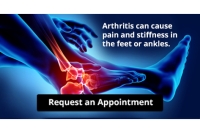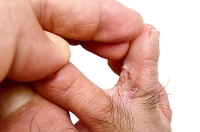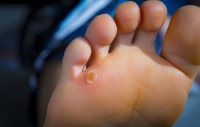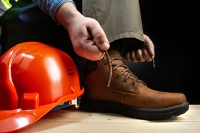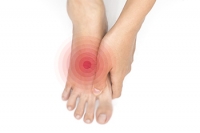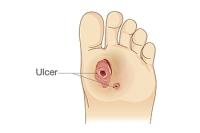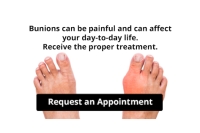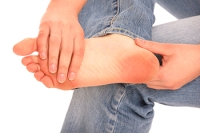
Blog (807)
Arthritis Can Cause Pain in the Feet and Ankles
Athlete’s Foot and How It Is Treated
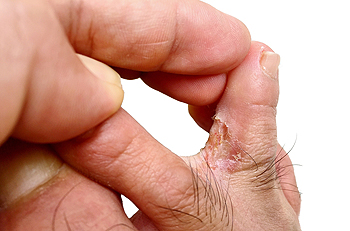
Athlete's foot, medically known as tinea pedis, is a common fungal infection affecting the feet and causing itchy, red, and flaky rashes. This condition, despite its name, can affect anyone not just athletes. It thrives in warm, humid conditions like sweaty feet inside poorly ventilated shoes or walking barefoot in locker rooms or by pool areas. Symptoms can include a rash, itching, skin cracking, and burning sensations, often affecting the area between the fourth and fifth toes. Risk factors include closed shoes, excessive foot sweating, poor hygiene, living in warm environments, and weakened immune systems. Men are more susceptible to athlete’s foot than women. Diagnosis relies on typical symptoms, but tests may be necessary in uncertain cases, including UV examination and skin or nail scrapings. Treatment and prevention involve washing the feet daily, drying the feet thoroughly, and wearing cotton socks and breathable shoes. Medical treatment includes antifungal creams, ointments, or tablets prescribed by a doctor. Early treatment is essential to prevent complications, especially for individuals with underlying health conditions. If you suspect you have athlete’s foot, it is strongly suggested that you make an appointment with a podiatrist for a diagnosis and treatment plan.
Athlete’s Foot
Athlete’s foot is often an uncomfortable condition to experience. Thankfully, podiatrists specialize in treating athlete’s foot and offer the best treatment options. If you have any questions about athlete’s foot, consult with Dr. Kenneth Donovan from Advanced Care Foot and Ankle. Our doctor will assess your condition and provide you with quality treatment.
What Is Athlete’s Foot?
Tinea pedis, more commonly known as athlete’s foot, is a non-serious and common fungal infection of the foot. Athlete’s foot is contagious and can be contracted by touching someone who has it or infected surfaces. The most common places contaminated by it are public showers, locker rooms, and swimming pools. Once contracted, it grows on feet that are left inside moist, dark, and warm shoes and socks.
Prevention
The most effective ways to prevent athlete’s foot include:
- Thoroughly washing and drying feet
- Avoid going barefoot in locker rooms and public showers
- Using shower shoes in public showers
- Wearing socks that allow the feet to breathe
- Changing socks and shoes frequently if you sweat a lot
Symptoms
Athlete’s foot initially occurs as a rash between the toes. However, if left undiagnosed, it can spread to the sides and bottom of the feet, toenails, and if touched by hand, the hands themselves. Symptoms include:
- Redness
- Burning
- Itching
- Scaly and peeling skin
Diagnosis and Treatment
Diagnosis is quick and easy. Skin samples will be taken and either viewed under a microscope or sent to a lab for testing. Sometimes, a podiatrist can diagnose it based on simply looking at it. Once confirmed, treatment options include oral and topical antifungal medications.
If you have any questions, please feel free to contact one of our offices located in Warren, Livingston, and Toms River, NJ . We offer the newest diagnostic and treatment technologies for all your foot care needs.
Benefits of Orthotics for Cycling

Cycling offers numerous health benefits, including cardiovascular improvement, enhanced joint mobility, and strengthened leg muscles. However, cycling without the proper footwear also can strain your lower limbs. While regular running shoes are suitable for occasional cyclists, dedicated cyclists who spend hours daily on the road or in the gym require specialized cycling shoes. Orthotics can play a pivotal role in boosting cycling performance as they can help to increase pedal efficiency, enhance power output, and improve foot stability. They also can help to reduce foot fatigue, improve arch support, provide better metatarsal padding, and offer relief from plantar fascial tension. Custom-made shoe insoles are an important consideration for cycling enthusiasts with flat feet, supination, pronation issues, or specific conditions like plantar fasciitis. A podiatrist can make a set of orthotics designed to fit your unique foot structure, using custom molds that mirror the exact shape of the foot. For help with custom shoe inserts made specifically for cycling shoes, it is suggested that you make an appointment with a podiatrist.
If you are having discomfort in your feet and would like to try orthotics, contact Dr. Kenneth Donovan from Advanced Care Foot and Ankle. Our doctor can provide the care you need to keep you pain-free and on your feet.
What Are Orthotics?
Orthotics are inserts you can place into your shoes to help with a variety of foot problems such as flat feet or foot pain. Orthotics provide relief and comfort for minor foot and heel pain but can’t correct serious biomechanical problems in your feet.
Over-the-Counter Inserts
Orthotics come in a wide variety of over-the-counter inserts that are used to treat foot pain, heel pain, and minor problems. For example, arch supports can be inserted into your shoes to help correct overarched or flat feet, while gel insoles are often used because they provide comfort and relief from foot and heel pain by alleviating pressure.
Prescription Orthotics
If over-the-counter inserts don’t work for you or if you have a more severe foot concern, it is possible to have your podiatrist prescribe custom orthotics. These high-quality inserts are designed to treat problems such as abnormal motion, plantar fasciitis, and severe forms of heel pain. They can even be used to help patients suffering from diabetes by treating foot ulcers and painful calluses and are usually molded to your feet individually, which allows them to provide full support and comfort.
If you are experiencing minor to severe foot or heel pain, it’s recommended to speak with your podiatrist about the possibilities of using orthotics. A podiatrist can determine which type of orthotic is right for you and allow you to take the first steps towards being pain-free.
If you have any questions please contact one of our offices located in Warren, Livingston, and Toms River, NJ . We offer the newest diagnostic and treatment technologies for all your foot and ankle needs.
Possible Remedies for Corns on the Feet
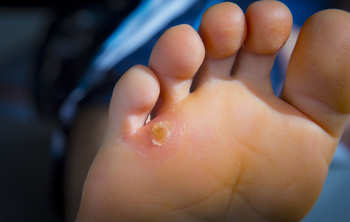
Foot corns are characterized by bumps that are thickened layers of hard skin and form on bony areas of the feet. They generally occur on the tops and sides of the toes, due to friction and pressure. Ill-fitting shoes and socks can contribute to their development. Some people with conditions that cause abnormal alignment of the bones in the feet, such as arthritis, bunions, or hammertoes, may be at a higher risk for developing corns. There are three types of foot corns consisting of hard, soft, and seed corns. Hard corns are firm when touched, and form on the tops of toes. Soft corns are pliable and typically form between the toes. Seed corns are very small and usually occur on the soles of the feet. Corns are sometimes confused with calluses but differ in location, size, tenderness, and inflammation. Preventing foot corns involves wearing well-fitting, comfortable shoes, and especially avoiding high heels and pointy-toed footwear. One can soak their foot and gently exfoliate the skin of the corn with a pumice stone or foot file. Covering the corn can protect against friction. If you have corns that are causing pain, or if you also have diabetes, it is strongly suggested that you make an appointment with a podiatrist who can provide additional treatment that can prevent complications.
If you have any concerns regarding your feet and ankles, contact Dr. Kenneth Donovan of Advanced Care Foot and Ankle. Our doctor will treat your foot and ankle needs.
Corns: What Are They? and How Do You Get Rid of Them?
Corns can be described as areas of the skin that have thickened to the point of becoming painful or irritating. They are often layers and layers of the skin that have become dry and rough, and are normally smaller than calluses.
Ways to Prevent Corns
There are many ways to get rid of painful corns such as wearing:
- Well-fitting socks
- Comfortable shoes that are not tight around your foot
- Shoes that offer support
Treating Corns
Treatment of corns involves removing the dead skin that has built up in the specific area of the foot. Consult with Our doctor to determine the best treatment option for your case of corns.
If you have any questions please feel free to contact one of our offices located in Warren, Livingston, and Toms River, NJ . We offer the newest diagnostic and treatment technologies for all your foot and ankle needs.
Gout Pain Can Be Managed
Essential Foot Protection Tips While Working
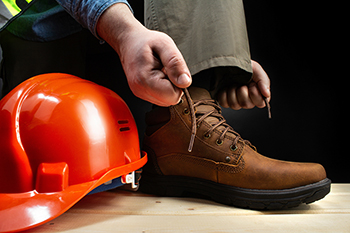
Your feet play a crucial role in your daily activities, especially at work. Whether you're in a physically demanding job or spend hours at a desk, it's essential to prioritize foot protection. It is beneficial to invest in high-quality, sturdy footwear that provides ample support and fits well. Steel-toed boots are essential to wear while working in hazardous environments. Many people choose to wear customized orthotic inserts which can enhance comfort, reduce fatigue, and prevent injuries by providing additional arch support. Additionally, be aware of slippery surfaces, sharp objects, or potential hazards that could lead to accidents. If your job involves standing or walking for long periods, taking regular breaks can help the feet to rest and avoid discomfort. Performing foot and ankle exercises can strengthen the muscles and increase flexibility, reducing the risk of strains and sprains. By prioritizing foot protection, you can maintain your overall well-being and ensure optimal performance throughout your workday. If you would like more information about foot protection during the work day, it is suggested that you consult with a podiatrist who can provide you with useful tips.
While working on the feet, it is important to take the proper care of them. For more information about working on your feet, contact Dr. Kenneth Donovan from Advanced Care Foot and Ankle. Our doctor will treat your foot and ankle needs.
Working on Your Feet
Standing on your feet for long periods of time can cause stress and pain in your feet. Your whole body may experience change in terms of posture, back pain, bunions, callouses and or plantar warts. There are ways to avoid these conditions with proper foot care, smart choices and correct posture.
Positive Changes
Negative heeled shoe – Choosing this shoe type places the heel slightly lower than the ball of the foot. These are great for overall foot health. Find shoes that fit you correctly.
Go barefoot – Our feet were not designed to be enclosed for all hours of the day. Try to periodically expose your feet to air.
Eliminate Pain
Foot Exercises – Performing simple exercises, incorporating yoga and doing stretches are beneficial. This will allow increased blood flow to the area and muscles of the foot.
Achilles tendon – Stretching the foot out flat on the floor will relax the calf muscles and tendon. These exercises can be performed almost anywhere. Make sure you add these exercises to your daily regimen.
With a little bit of this information and knowing more about foot health, you will notice changes. Foot stretches and proper footwear will help with pain and prevent further issues.
If you have any questions please feel free to contact one of our offices located in Warren, Livingston, and Toms River, NJ . We offer the newest diagnostic and treatment technologies for all your foot and ankle needs.
Foot Care Tips for Diabetics
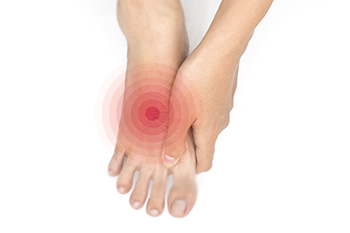
A common side effect of diabetes is the tendency to develop peripheral neuropathy and circulation problems. Both are the result of long-term high blood sugar levels. As a result, the feet may become numb and the ability to heal may be impeded. These consequences can lead to the development of foot ulcers. Because the feet become numb, cuts and cracks in the skin may not be felt, and because of arterial disease that constricts the blood vessels to the extremities, healing takes longer. For those reasons, a daily routine of foot care is essential to anyone with diabetes. Medical professionals, such as podiatrists, suggest that washing and drying the feet daily is a must. Examining the feet for sores or cuts should happen daily. Keeping the feet elevated as often as possible is also a good idea. Experts also recommend changing to footwear that fits well, and wearing socks can help to protect the feet. For treatment of foot problems related to diabetes, it is suggested that you make regular visits to a podiatrist.
Diabetic foot care is important in preventing foot ailments such as ulcers. If you are suffering from diabetes or have any other concerns about your feet, contact Dr. Kenneth Donovan from Advanced Care Foot and Ankle. Our doctor can provide the care you need to keep you pain-free and on your feet.
Diabetic Foot Care
Diabetes affects millions of people every year. The condition can damage blood vessels in many parts of the body, especially the feet. Because of this, taking care of your feet is essential if you have diabetes, and having a podiatrist help monitor your foot health is highly recommended.
The Importance of Caring for Your Feet
- Routinely inspect your feet for bruises or sores.
- Wear socks that fit your feet comfortably.
- Wear comfortable shoes that provide adequate support.
Patients with diabetes should have their doctor monitor their blood levels, as blood sugar levels play such a huge role in diabetic care. Monitoring these levels on a regular basis is highly advised.
It is always best to inform your healthcare professional of any concerns you may have regarding your feet, especially for diabetic patients. Early treatment and routine foot examinations are keys to maintaining proper health, especially because severe complications can arise if proper treatment is not applied.
If you have any questions please feel free to contact one of our offices located in Warren, Livingston, and Toms River, NJ . We offer the newest diagnostic and treatment technologies for all your foot and ankle needs.
The Seriousness of a Diabetic Foot Ulcer
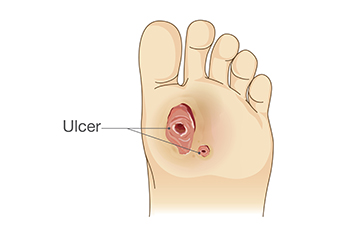
People who are diabetic are generally concerned about developing a diabetic foot ulcer. Proper wound care treatment is crucial for this type of infection, and serious consequences may ensue if prompt medical attention is not received. Research has shown that approximately 25 percent of diabetic patients will develop a foot ulcer, and implementing prevention techniques may help to avoid this. An essential step for this type of wound care treatment can be to remove the necrotic or dead wound tissue. This is referred to as debridement, and there are various ways to treat this. It is important to reduce any pressure on the wound, and often an off-loading boot is worn. The wound is typically drained, and the healthy underlying tissue is examined. Effective prevention methods can include keeping glucose levels within a normal range, drinking plenty of water daily, and eating healthy foods. If you have a diabetic foot ulcer, it is strongly suggested that you are under the care of a podiatrist who can provide the proper treatment.
Wound care is an important part in dealing with diabetes. If you have diabetes and a foot wound or would like more information about wound care for diabetics, consult with Dr. Kenneth Donovan from Advanced Care Foot and Ankle. Our doctor will assess your condition and provide you with quality foot and ankle treatment.
What Is Wound Care?
Wound care is the practice of taking proper care of a wound. This can range from the smallest to the largest of wounds. While everyone can benefit from proper wound care, it is much more important for diabetics. Diabetics often suffer from poor blood circulation which causes wounds to heal much slower than they would in a non-diabetic.
What Is the Importance of Wound Care?
While it may not seem apparent with small ulcers on the foot, for diabetics, any size ulcer can become infected. Diabetics often also suffer from neuropathy, or nerve loss. This means they might not even feel when they have an ulcer on their foot. If the wound becomes severely infected, amputation may be necessary. Therefore, it is of the upmost importance to properly care for any and all foot wounds.
How to Care for Wounds
The best way to care for foot wounds is to prevent them. For diabetics, this means daily inspections of the feet for any signs of abnormalities or ulcers. It is also recommended to see a podiatrist several times a year for a foot inspection. If you do have an ulcer, run the wound under water to clear dirt from the wound; then apply antibiotic ointment to the wound and cover with a bandage. Bandages should be changed daily and keeping pressure off the wound is smart. It is advised to see a podiatrist, who can keep an eye on it.
If you have any questions, please feel free to contact one of our offices located in Warren, Livingston, and Toms River, NJ . We offer the newest diagnostic and treatment technologies for all your foot care needs.
Are Bunions Affecting Your Everyday Life?
The Importance of Taking Foot Pain Seriously
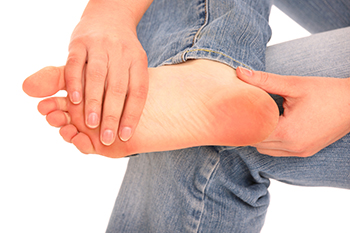
Our feet are the foundation of our support and facilitate our mobility. While it is common to experience foot pain occasionally, dismissing or ignoring it can have serious consequences. Foot pain can stem from various causes, ranging from simple issues like ill-fitting footwear to underlying medical conditions that require immediate attention. Since such pain can arise from multiple factors, it is important to identify the source to differentiate between discomfort that may be temporary and signs of a more serious problem. Medical conditions, such as diabetes, with the common complication of neuropathy, or deep vein thrombosis involving blood clots can cause foot pain, and it is crucial to address these issues promptly. Age-related foot problems, such as arthritis, can cause chronic foot pain that requires care. Given the diverse causes of foot pain and the potential severity of complications, if you are having such pain, it is strongly suggested that you consult a podiatrist for an accurate diagnosis and suitable treatment.
Foot Pain
Foot pain can be extremely painful and debilitating. If you have a foot pain, consult with Dr. Kenneth Donovan from Advanced Care Foot and Ankle. Our doctor will assess your condition and provide you with quality foot and ankle treatment.
Causes
Foot pain is a very broad condition that could be caused by one or more ailments. The most common include:
- Bunions
- Hammertoes
- Plantar Fasciitis
- Bone Spurs
- Corns
- Tarsal Tunnel Syndrome
- Ingrown Toenails
- Arthritis (such as Gout, Rheumatoid, and Osteoarthritis)
- Flat Feet
- Injury (from stress fractures, broken toe, foot, ankle, Achilles tendon ruptures, and sprains)
- And more
Diagnosis
To figure out the cause of foot pain, podiatrists utilize several different methods. This can range from simple visual inspections and sensation tests to X-rays and MRI scans. Prior medical history, family medical history, and any recent physical traumatic events will all be taken into consideration for a proper diagnosis.
Treatment
Treatment depends upon the cause of the foot pain. Whether it is resting, staying off the foot, or having surgery; podiatrists have a number of treatment options available for foot pain.
If you have any questions, please feel free to contact one of our offices located in Warren, Livingston, and Toms River, NJ . We offer the newest diagnostic and treatment technologies for all your foot care needs.
